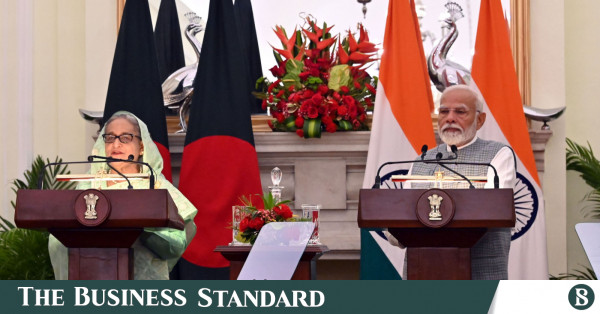What PM Hasina’s India trip means for Bangladesh


The announcement to begin negotiations for a Comprehensive Economic Partnership Agreement (CEPA) between Bangladesh and India along with Delhi’s consent to allow the import of electricity from Nepal to Bangladesh via Indian territory, will yield positive outcomes, say experts.
They suggest that if Bangladesh joins India’s Indo-Pacific Vision Initiative and implements regional connectivity projects, including rail links, bilateral trade and investment will increase.
While they welcome the decision to renew the Ganges Water Sharing Treaty with optimism, experts describe the lack of progress on the Teesta Water-sharing Treaty, equitable distribution of six cross-border rivers, and ending border killings as frustrating.
They also said the announcement of an Indian technical delegation visiting Bangladesh to review the proposed “Teesta River Comprehensive Management and Restoration Project” may intensify the conflict between China and India over this project.
These decisions were made during a summit meeting between the prime ministers of Bangladesh and India in Delhi yesterday. Bangladesh Prime Minister Sheikh Hasina’s visit marked the first high-level meeting since Narendra Modi was sworn in for a third consecutive term as India’s prime minister earlier this month.
According to the final draft report of the joint feasibility study of Dhaka and Delhi, if the Comprehensive Economic Partnership Agreement (CEPA) is signed, the export income of Bangladesh will increase up to $3-$5 billion in the next seven to 10 years.
Currently, Bangladesh’s export to India amounts at about $2 billion a year and India’s export to Bangladesh is about $14 billion.
Honorary Fellow of the Centre for Policy Dialogue (CPD) Dr Mustafizur Rahman told TBS that if the prime ministers of both countries agree to commence CEPA negotiations, the bilateral discussions will accelerate. “Therefore, we must be prepared for what we want from India and what India might want from us.”
He explained that the CEPA is not just a Free Trade Agreement (FTA). In addition to trade, it encompasses various aspects of investment, connectivity, and technical cooperation, which will be beneficial for Bangladesh after its graduation from LDC status.
Former President of the Federation of Bangladesh Chambers of Commerce and Industry (FBCCI) Jasim Uddin told TBS that the signing of the CEPA could increase India’s investment in Bangladesh.
“However, efforts should be made to remove various non-tariff barriers on Bangladeshi exports to India and to address the imposition of anti-dumping duties by India on several Bangladeshi products.”
Former diplomat M Humayun Kabir said there are numerous tariff and non-tariff barriers hindering the export of goods from Bangladesh to India, which have been discussed at the prime ministerial level but lack formal documentation. “As a result, it is unclear whether these obstacles will be addressed under the CEPA agreement.”
Importing electricity from Nepal via India a good sign
Diplomats and businessmen view the signing of the MoU on Bangladesh’s proposal to import 40MW of electricity from Nepal via Indian territory as very positive.
Former diplomat Humayun Kabir said, “We have been importing electricity from India for a long time. By investing equity in Nepal and Bhutan, more electricity can be imported from there at a lower cost.”
Former FBCCI President Jasim Uddin noted that the more electricity that can be brought from Nepal at a lower price, the better it is for Bangladesh.
Mustafizur Rahman added that discussions on electricity imports from Nepal and sub-regional energy cooperation are very promising initiatives.
Connectivity initiatives promising
Experts and stakeholders view the agreement between Bangladesh and India to boost rail connectivity and transport Bangladeshi products on returning Indian freight trains as a significant development. They believe this connectivity will enhance regional trade and investment and promote regional integration.
CPD’s Mustafizur Rahman noted that containers from India currently return empty, and companies operating these trains would benefit from carrying goods from Bangladesh on their return journey.
Jasim Uddin highlighted that connectivity has enabled substantial trade within the European Union, North American Free Trade Agreement (NAFTA), and ASEAN countries, whereas trade within the SAARC region remains less than 5%.
He pointed out that Bangladesh is heavily investing in railways, roads, and deep seaports, and if regional countries, including India, utilise these infrastructures, their investments in Bangladesh will increase.
Former diplomat Humayun Kabir mentioned that the announcements of the Chattogram-Kolkata bus service and Rajshahi-Kolkata train service are routine developments.
No updates on Teesta water sharing
After the meeting between the prime ministers of Bangladesh and India, it was announced that an Indian technical committee would visit Bangladesh to review the proposed “Teesta River Comprehensive Management and Restoration Project.”
In this context, Humayun Kabir said, “The issue of Teesta water distribution has not been discussed. It is unclear what the Indian technical team will assess regarding the proposed project. We do not know if India intends to join the project or whether the Teesta water will be distributed within a specified period.”
He added, “There is also no documentation on the water distribution of six other transboundary rivers. It has not been mentioned whether the Joint River Commission will hold any meetings on this matter.”
“Border killings may have been discussed but were not documented. It would have been better if decisions had been made on these issues,” he added.
On joining India’s Indo-Pacific Vision Initiative
Indian Prime Minister Narendra Modi described Bangladesh’s decision to join India’s Indo-Pacific Vision Initiative as positive. According to AP, India is strengthening defence ties with Bangladesh to counterbalance China.
However, Shahab Enam Khan, professor of International Relations at Jahangirnagar University, told TBS that Bangladesh has decided to join the Indo-Pacific for economic development, emphasising that there is no military aspect involved.
He said Bangladesh’s approach to Indo-Pacific issues is very inclusive, involving many countries including China, Japan, and the USA. Bangladesh has already announced a policy on the Indo-Pacific and cannot violate its own mandate. By joining the Indo-Pacific, Bangladesh prioritises common economic development in the region and will not favour any single country.
Khan highlighted that Bangladesh’s primary security concerns are the ongoing conflict in Myanmar, the situation in North-East India, and the Hindu-Muslim conflict in India, along with domestic terrorism. He said economic priorities are the most important for Bangladesh.
Former diplomat Humayun Kabir noted that India has included Bangladesh in its Indo-Pacific vision, but the specifics of this vision and Bangladesh’s role in it remain unclear.
The Indo-Pacific region is home to 60% of the world’s population and accounts for two-thirds of global economic output. Half of global trade transits the region, and 90% of India’s own trade travels through its waters.




